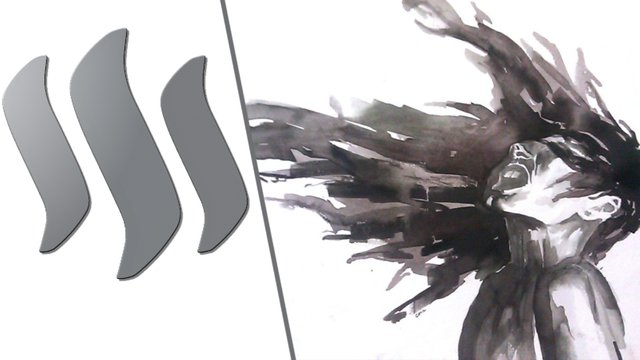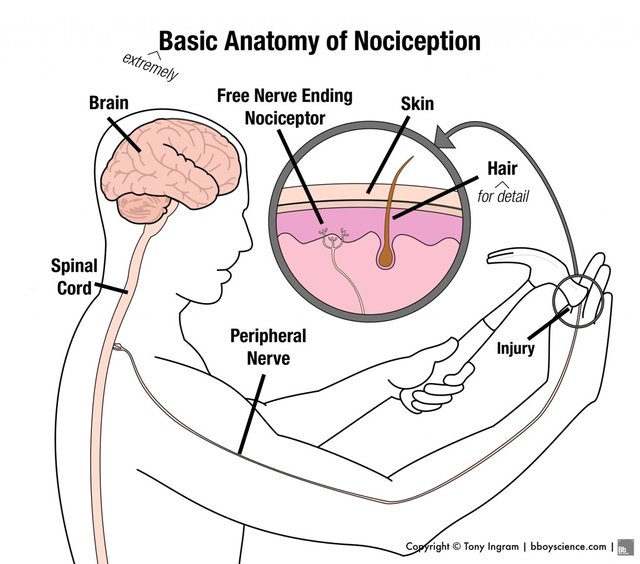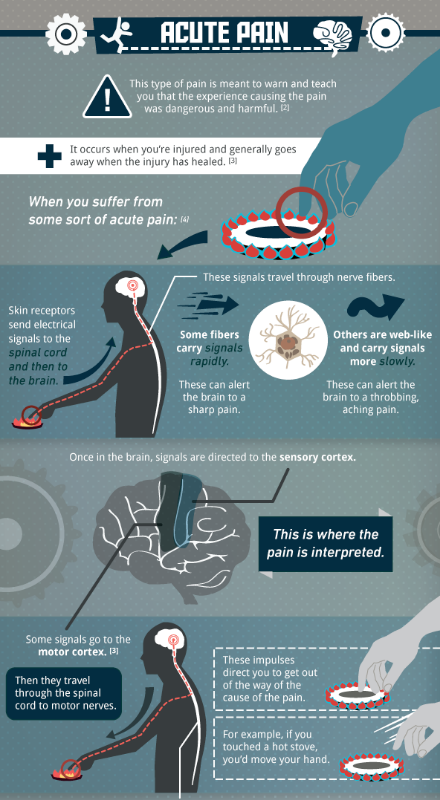
Pain: It comes in different variations, and as much as we'd like to avoid it, it's a part of life.
As tempting as a life without pain sounds, pain is actually very important and not feeling it isn't as fun as it may seem:
Pain is a warning signal to protect us - from further damage, and also from ourselves.
It makes us back away from danger, and acts as a reflex - for example by pulling your hand away from the hot oven.
So now imagine if you wouldn't experience any pain - you could touch something burning hot and just leave your hand there, causing more and more damage.
Or you could bite your own tongue while chewing - and keep going, because you didn't notice.
Or you could hurt your foot, but carry on working out and walking and making the injury a lot worse.
So as you can see, pain is important!
Pain in the Body
Pain is recognized by special nerve cells that sense when tissue is being damaged - these are called nociceptors.
They only fire when a certain pain threshold is being reached.
For example, gently laying your finger on the tip of a needle doesn't hurt. You can feel the needle, but those are just your general senses.
But when you push the needle further into your flesh, you reach the nociceptor threshold at some point - making you feel pain!
As soon as that has happened, your body sends special tuning chemicals to that area.
These tuning chemicals lower the pain threshold and as a result, that area of your body now hurts even more, even at the slightest touch that normally doesn't hurt.
You've experienced this with every bruise or cut - the reason for this effect is to warn against further damage.

Pain in the Brain
As soon as our nociceptors sense pain, they fire and send signals to our spinal cord.
There, the signal travels along the sensing pathway - this is like a highway that transports signals from the spinal cord to the brain in no time!
The sensing pathway ends in the cortex, an area of the brain that then decides how to act upon the pain signal.
Several different processes and systems are then being activated:

One of the brain's first responses is to activate the motor pathways, and making you back away from danger.
This is the reflex of pulling your hand back from touching a hot or painful surface!
Also, our attention gets directed to the area of pain.
This is due to the salience network - a system of interconnected brain cells. We are very selective with our attention, but since pain is almost always a warning for something dangerous, our whole attention immediately turns to that area.
This is also why you can distract an itch or lower pain with more pain: your body will generally pay more attention to the area with more pain, making you forget other sensations more.
Then, to cope with the pain, the brain activates modulation networks that release endorphins and enkephalins - hormones that help us regulate and reduce the pain, making us feel better and calmer, and helping us to cope with the situation.
All of these processes work together to create the experience of pain, prevent further damage, and help us deal with it.
The theory behind it is the same for every human, but the perception of pain as well as the sensitivity and initial threshold vary a lot from person to person.
The future of pain medication
Normally, pain medications are created so that they can help the largest number of people.
But since pain is so different for everyone, there's always someone who experiences side effect or for whom the medication doesn't work.
This is especially bad for people with chronic pain, that have tried every conventional method but nothing seems to work.
Now, scientists are working on new treatments that block certain pain-sensing attention networks , and tailor them to individual patients!
This can be done for example by mapping brain pathways with magnetic resonance imaging.
This personalized medicine could revolutionize our future - and maybe take us a step closer to a world where we can still benefit from the protection of pain, but also stop it if we don't want to cope with it anymore!
Images: 1, 2, 3, Sources: 1, 2, 3, 4, 5, 6
- Instagram -

© Sirwinchester
Bring the pain or remain unawares.
Downvoting a post can decrease pending rewards and make it less visible. Common reasons:
Submit
Exactly, it's an important warning factor otherwise we'd be unaware of an injury and could get hurt much worse..
Downvoting a post can decrease pending rewards and make it less visible. Common reasons:
Submit
Hi @sirwinchester
Interesting post, thanks for sharing
Downvoting a post can decrease pending rewards and make it less visible. Common reasons:
Submit
Thank you for your comment, and I'm glad you enjoyed the post!
Downvoting a post can decrease pending rewards and make it less visible. Common reasons:
Submit
When I first read the beginning I thought life without pain would be awesome (obviously) but I guess you're right, it is actually pretty important to protect us from MORE damage!
Downvoting a post can decrease pending rewards and make it less visible. Common reasons:
Submit
Yeah it sounds great at first, but when you really think about it, pain is saving you from more trouble.
Of course, that's only acute pain and there are other kinds, but in general nature had a very good reason to equip us with a feeling like pain.
Downvoting a post can decrease pending rewards and make it less visible. Common reasons:
Submit
There is an illness where people dont feel any pain. Most of them die fairly young.
What? My arm is broken? Damn, didn't feel anything! That's why I dropped the hammer on my foot. Ups, that seems broken, too! What about my ribs, still not puncturing my lung?
(slightly exaggerated example)
Downvoting a post can decrease pending rewards and make it less visible. Common reasons:
Submit
yes it's a rare but very dangerous disease, and like you said most people die too young because they simply didn't have pain as a protective mechanism ..
Downvoting a post can decrease pending rewards and make it less visible. Common reasons:
Submit
Most people try to fight pain. But that is the wrong way to cope with it. Accept it. Instead of putting a lot of effort into fighting the pain, get meditative about it. That lowers the pain (or higher threshold ^^) after a bit.
Even works on tinitus afaik.
Downvoting a post can decrease pending rewards and make it less visible. Common reasons:
Submit
You're right, meditation is a great way to get your mind off of things and relieve the pain!
Downvoting a post can decrease pending rewards and make it less visible. Common reasons:
Submit
Hey @sirwinchester, great write up... as a professional in Pain Mitigation (and inducement) I really enjoyed the way you wrote it.
Thanks and here is a bit on the first receptor:
https://steemit.com/health/@kyusho/the-first-receptor
Downvoting a post can decrease pending rewards and make it less visible. Common reasons:
Submit
That's a very interesting post!
And thank you for the feedback, appreciate it and glad to hear that you enjoyed it!
Downvoting a post can decrease pending rewards and make it less visible. Common reasons:
Submit
I always love your first image. Great Post BTW.
Downvoting a post can decrease pending rewards and make it less visible. Common reasons:
Submit
Thank you, I appreciate that compliment a lot!
Downvoting a post can decrease pending rewards and make it less visible. Common reasons:
Submit
This post has been ranked within the top 10 most undervalued posts in the second half of Dec 12. We estimate that this post is undervalued by $25.38 as compared to a scenario in which every voter had an equal say.
See the full rankings and details in The Daily Tribune: Dec 12 - Part II. You can also read about some of our methodology, data analysis and technical details in our initial post.
If you are the author and would prefer not to receive these comments, simply reply "Stop" to this comment.
Downvoting a post can decrease pending rewards and make it less visible. Common reasons:
Submit